Tiwari House – The most exciting wine project in the ever popular Badacsony region of Hungary
Written by Geri Ádám
05.06.2021
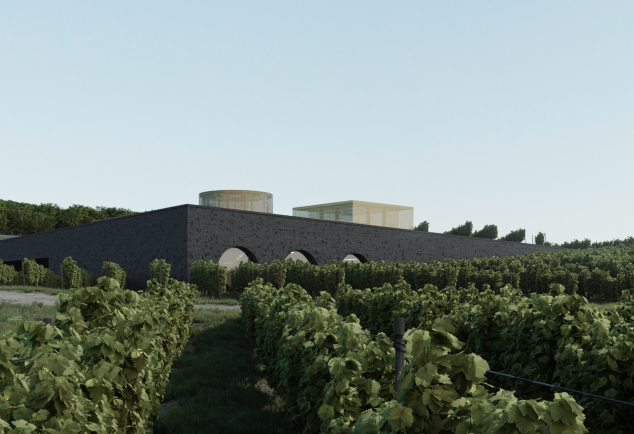
What is the story of Tiwari House? When did it start, where exactly is it located, has the
estate already been built up (there are no photos on the website, only 3D visuals)?
Shashi: Although I was introduced to wines in my late teenage years, I was a whiskey guy. It wasn’t until I felt need and desire to impress Olivia that I began showing interest in wine. After we visited Badacsony together, I started appreciating sensory elements of wine. The genesis of Tiwari House is rooted in the soul of this journey, this experience.
Livia: Yes, while we travelled the world, we experienced wines in different settings. We developed passion. It is probably true when they say passion is the drunkenness of the mind, we bought a 2-hectare vineyard in Badacsonytördemics. We made a humble beginning without an identity. But, it does prove the vigour of our vision that Tiwari House is realised in a short space of time, we launched our wines, we purchased our Nemesgulács estate, and we planned development of a future-proof winery in Nemesgulács which will bring innumerable benefits to the local economy, enhance grape production standards, add processing capacity, and so on.
Who owns the estate (family, investor), do they have a wine connection before?
Shashi: It’s a family business. Family first, business second.
Livia: Whoever works with us, are treated like a family member with trust and respect. It’s quite important to note that we live in London, Shashi works in financial services, I work in media, we do not depend on income from our wines, and profitability is not our primary goal. We make distinction between creating wine and making wine. However, Tiwari House is intensely professional with strong family values, with members having independence to create.
Shashi: Although I was introduced to wines in my late teenage years, I was a whiskey guy. It wasn’t until I felt need and desire to impress Olivia that I began showing interest in wine. After we visited Badacsony together, I started appreciating sensory elements of wine. The genesis of Tiwari House is rooted in the soul of this journey, this experience.
Livia: Yes, while we travelled the world, we experienced wines in different settings. We developed passion. It is probably true when they say passion is the drunkenness of the mind, we bought a 2-hectare vineyard in Badacsonytördemics. We made a humble beginning without an identity. But, it does prove the vigour of our vision that Tiwari House is realised in a short space of time, we launched our wines, we purchased our Nemesgulács estate, and we planned development of a future-proof winery in Nemesgulács which will bring innumerable benefits to the local economy, enhance grape production standards, add processing capacity, and so on.
Who owns the estate (family, investor), do they have a wine connection before?
Shashi: It’s a family business. Family first, business second.
Livia: Whoever works with us, are treated like a family member with trust and respect. It’s quite important to note that we live in London, Shashi works in financial services, I work in media, we do not depend on income from our wines, and profitability is not our primary goal. We make distinction between creating wine and making wine. However, Tiwari House is intensely professional with strong family values, with members having independence to create.
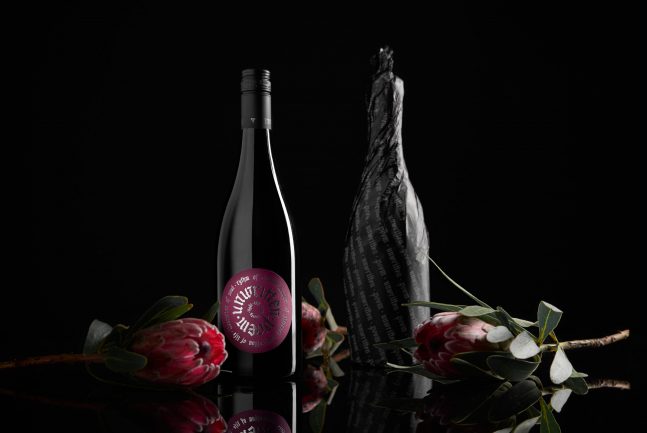
In addition to their own grapes, they also play the role of integrator, from how many
farmers, what kind of grapes are purchased, in what quantity (what percentage of their
total production)?
Shashi: We keep our heads above the water unless opportunity presents itself like a magical unicorn. Currently we produce enough high-quality grapes from our own vineyards to create 30-40 thousand bottles of sparkling white, sparkling rose and red wines, including traditional method sparkling. We control quality from grape production to processing, to vinification, to bottling to point-of-sale.
Livia: Let me tell you a more exciting side of it, something akin to the magical unicorn. In one and a half years, we will be buying 1200 tons of grapes across 15 varieties from the region, to feed our processing capacity. We have already started working with some grape growers to upgrade the quality standards, deploy more sustainable methods, apply organic / biodynamic standards and so on. We will be launching a focussed incentives program very soon. Many small vineyards owners, who do not take care of their vineyards well enough and do not harvest due to depressed grape prices, will see an opportunity to work with us. So, watch out because more to come in this space.
How many bottles of wine are made in a year, what is the planned full capacity?
Shashi: Currently we create about 40,000 bottles every year. Our Nemesgulács production facility is planned to produce annually 1 million bottles of wines and 7-8 million bottles of natural juices, with varietal aromas, and without preservatives and additives.
Shashi: We keep our heads above the water unless opportunity presents itself like a magical unicorn. Currently we produce enough high-quality grapes from our own vineyards to create 30-40 thousand bottles of sparkling white, sparkling rose and red wines, including traditional method sparkling. We control quality from grape production to processing, to vinification, to bottling to point-of-sale.
Livia: Let me tell you a more exciting side of it, something akin to the magical unicorn. In one and a half years, we will be buying 1200 tons of grapes across 15 varieties from the region, to feed our processing capacity. We have already started working with some grape growers to upgrade the quality standards, deploy more sustainable methods, apply organic / biodynamic standards and so on. We will be launching a focussed incentives program very soon. Many small vineyards owners, who do not take care of their vineyards well enough and do not harvest due to depressed grape prices, will see an opportunity to work with us. So, watch out because more to come in this space.
How many bottles of wine are made in a year, what is the planned full capacity?
Shashi: Currently we create about 40,000 bottles every year. Our Nemesgulács production facility is planned to produce annually 1 million bottles of wines and 7-8 million bottles of natural juices, with varietal aromas, and without preservatives and additives.
How would you describe what Tiwari House wine is like, if you taste it, what style notes
does it carry?
Livia: Our Unwritten Poem range is an abstract take on winemaking artistry, well rounded sophistication, and consumers’ own poetic relationships with it. Wines are fruit-forward, juicy, pleasant, harmonious, clean and crisp, suitable for all occasions. In each one of them, you should taste the Badacsony terroir and witness the marriage of varietal aromas and flavour depths. Our white sparkling reminds me of green apple, dill, fresh spring and minerals, Rosé sparkling reminds me of strawberries and rosehip with gentle minerality, and Red wine delivers velvet punches of juicy flavours in three layers encompassing ripe cherries, dark berries, chocolate and tobacco.
Livia: Our Unwritten Poem range is an abstract take on winemaking artistry, well rounded sophistication, and consumers’ own poetic relationships with it. Wines are fruit-forward, juicy, pleasant, harmonious, clean and crisp, suitable for all occasions. In each one of them, you should taste the Badacsony terroir and witness the marriage of varietal aromas and flavour depths. Our white sparkling reminds me of green apple, dill, fresh spring and minerals, Rosé sparkling reminds me of strawberries and rosehip with gentle minerality, and Red wine delivers velvet punches of juicy flavours in three layers encompassing ripe cherries, dark berries, chocolate and tobacco.
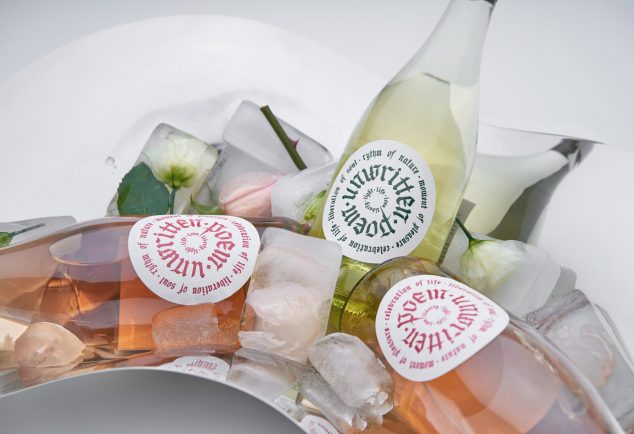
What varieties do you work with traditional champagnes? When will the first bottles be
released?
Livia: Our Blanc methode traditionnelle is based on Budai and Keknyelü grape varieties. For Rosé methode traditionnelle, we are working with Pinot Noir playing a lead role and Syrah in a supporting role. We have been tasting them regularly in winemakers’ groups. They are developing well, surpassing our expectations. We are very excited about them to reach their potential.
Shashi: Indeed, rhythm of nature will be presented for celebration of life. If I am not mistaken, they will be fountains of delight. First release of bottles is planned in 2022 after 3 years of elaboration in cellars.
You are sustainability focussed. What does it mean to you?
Shashi: Let me take this if you don’t mind. We want to earn reputation for commitment to the environment, and for inspiring sustainable practices in wine industry. Our work has just started. We just completed life cycle analysis of our wine products which reveals environmental impacts at each stage from grape growing, harvesting, processing, fermentation, bottling, warehousing, distribution to the eventual consumption. We are making some baby steps now, while we anticipate making some giant steps later when Nemesgulács winery is operational. We started cultivating organic grapes in 2 hectares since the last year; we are following biodynamic standards of grape growing in 1.5 hectares; we are now looking at bottles and bottle weights which have big carbon footprint. Looking forward, we will be buying energy from renewable sources, increasing energy usage efficiency, and recovering energy and CO2 which is a giant topic for us. We will be reducing and recycling wastes. In nutshell, our sustainability mission addresses consistency in product quality, financial growth of the company, quality of life of local communities, and surrounding environment.
Livia: Our Blanc methode traditionnelle is based on Budai and Keknyelü grape varieties. For Rosé methode traditionnelle, we are working with Pinot Noir playing a lead role and Syrah in a supporting role. We have been tasting them regularly in winemakers’ groups. They are developing well, surpassing our expectations. We are very excited about them to reach their potential.
Shashi: Indeed, rhythm of nature will be presented for celebration of life. If I am not mistaken, they will be fountains of delight. First release of bottles is planned in 2022 after 3 years of elaboration in cellars.
You are sustainability focussed. What does it mean to you?
Shashi: Let me take this if you don’t mind. We want to earn reputation for commitment to the environment, and for inspiring sustainable practices in wine industry. Our work has just started. We just completed life cycle analysis of our wine products which reveals environmental impacts at each stage from grape growing, harvesting, processing, fermentation, bottling, warehousing, distribution to the eventual consumption. We are making some baby steps now, while we anticipate making some giant steps later when Nemesgulács winery is operational. We started cultivating organic grapes in 2 hectares since the last year; we are following biodynamic standards of grape growing in 1.5 hectares; we are now looking at bottles and bottle weights which have big carbon footprint. Looking forward, we will be buying energy from renewable sources, increasing energy usage efficiency, and recovering energy and CO2 which is a giant topic for us. We will be reducing and recycling wastes. In nutshell, our sustainability mission addresses consistency in product quality, financial growth of the company, quality of life of local communities, and surrounding environment.
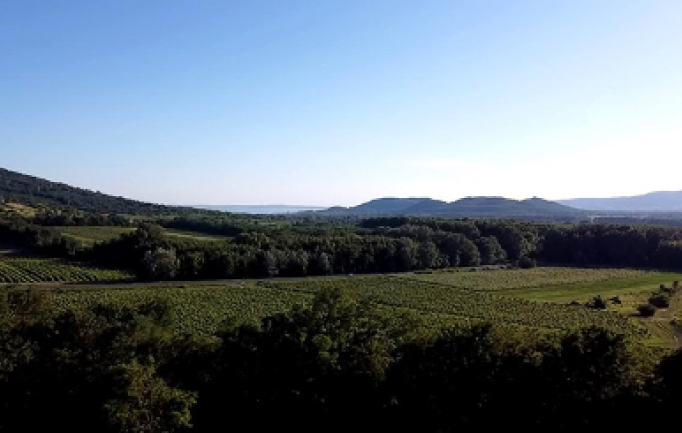
Where can we buy your wines?
Livia: Our online webshop is operational with top level of security. Thanks to some great logistics partnerships, we are delivering wines to the door globally. We are also offering a wide range of payment choices. We are now looking to work with distributors in domestic and European markets to reach on-trade markets in hotels, restaurants, cafes, clubs.
Do you feel more pressure as a new producer? how do you balance your time now between all of the different endeavours?
Shashi: Yes and No. Yes, we feel pressure largely because our message and products should reach their intended consumers at their prime time, and creativity and passion should be incentivised. Everyone involved in this project with their time and efforts should be rewarded and feel satisfied. On the other hand, we have made financial commitment, but we do not depend on income from this which helps lowering the pressure a bit.
Livia: We balance our time by doing simple things like prioritising. Team is focussed on goals and share our values. We trust our partners. We travel more frequently to Hungary. A positive aspect of COVID-19 is that remote engagement with people have improved.
What are your plans for the future?
Olivia: We have a long list. We already have a concept of club which is somewhat working, we would like to bring it to the next level, make it more meaningful for members, give it a physical presence. We are in infancy stage of establishing a wine centre of excellence which is effectively a research centre about understanding wines and making wines understood. We will be providing a physical address to it too. So, it will be a gradual progress.
Shashi: All our initiatives will be fundamentally rooted in cooperation and collaboration on an equitable basis. We are finetuning partnership programs for all steps within the value chain, to build an ecosystem of shared value and deliver sustainable development agenda. We will keep moving in the positive direction and that’s the ultimate plan.
Read the original article on the popular Hungarian Wine blog: https://www.boraszportal.hu/borvilag/tiwari-house–az-elmult-evek-legizgalmasabb-borosprojektje- badacsonyban-8402
Livia: Our online webshop is operational with top level of security. Thanks to some great logistics partnerships, we are delivering wines to the door globally. We are also offering a wide range of payment choices. We are now looking to work with distributors in domestic and European markets to reach on-trade markets in hotels, restaurants, cafes, clubs.
Do you feel more pressure as a new producer? how do you balance your time now between all of the different endeavours?
Shashi: Yes and No. Yes, we feel pressure largely because our message and products should reach their intended consumers at their prime time, and creativity and passion should be incentivised. Everyone involved in this project with their time and efforts should be rewarded and feel satisfied. On the other hand, we have made financial commitment, but we do not depend on income from this which helps lowering the pressure a bit.
Livia: We balance our time by doing simple things like prioritising. Team is focussed on goals and share our values. We trust our partners. We travel more frequently to Hungary. A positive aspect of COVID-19 is that remote engagement with people have improved.
What are your plans for the future?
Olivia: We have a long list. We already have a concept of club which is somewhat working, we would like to bring it to the next level, make it more meaningful for members, give it a physical presence. We are in infancy stage of establishing a wine centre of excellence which is effectively a research centre about understanding wines and making wines understood. We will be providing a physical address to it too. So, it will be a gradual progress.
Shashi: All our initiatives will be fundamentally rooted in cooperation and collaboration on an equitable basis. We are finetuning partnership programs for all steps within the value chain, to build an ecosystem of shared value and deliver sustainable development agenda. We will keep moving in the positive direction and that’s the ultimate plan.
Read the original article on the popular Hungarian Wine blog: https://www.boraszportal.hu/borvilag/tiwari-house–az-elmult-evek-legizgalmasabb-borosprojektje- badacsonyban-8402


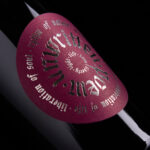

No comment yet, add your voice below!
Comments are closed for this article!